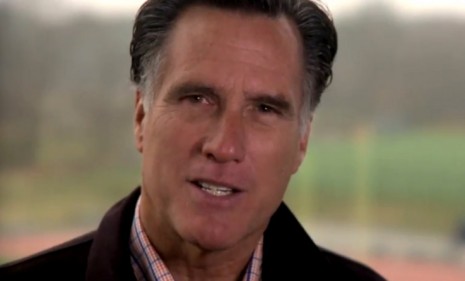Mitt Romney makes it (almost) official: Is he still the GOP frontrunner?
To no one's surprise, the former Massachusetts governor announces a presidential exploratory committee. Does he start the race in pole position?

A free daily email with the biggest news stories of the day – and the best features from TheWeek.com
You are now subscribed
Your newsletter sign-up was successful
The video: Mitt Romney took to YouTube on Monday to announce that he's formed a presidential exploratory committee, the first formal step to seeking the Republican nomination in 2012. Standing in front of an empty University of New Hampshire football field, Romney touts his job-creating experience in the private sector, and criticizes President Obama's economic policies as naive. (See the video below.) Only one other major GOP candidate has stepped this far into the race — former Minnesota Gov. Tim Pawlenty — but, so far, Romney remains first in most national GOP polls.
The reaction: Romney "starts the primary as a, if not the, frontrunner," says Adam Sorensen in TIME. But that doesn't mean it will be an easy path to the nomination. He has to raise lots of money to outlast a crowded GOP field, convince voters he has principles that don't shift with the political wind, and figure out how to deal with his legacy of "RomneyCare" in Massachusetts. On the other hand, he has "a top-flight political organization, a robust network, and a recognizable public persona." And yet, he made his "exciting announcement in one of the most boring videos I've ever seen," says Jonathan Capehart in The Washington Post. "If the nomination were won on announcements alone," so far Pawlenty "would win hands down." Judge for yourself:
A free daily email with the biggest news stories of the day – and the best features from TheWeek.com
The Week
Escape your echo chamber. Get the facts behind the news, plus analysis from multiple perspectives.

Sign up for The Week's Free Newsletters
From our morning news briefing to a weekly Good News Newsletter, get the best of The Week delivered directly to your inbox.
From our morning news briefing to a weekly Good News Newsletter, get the best of The Week delivered directly to your inbox.
-
 ‘Those rights don’t exist to protect criminals’
‘Those rights don’t exist to protect criminals’Instant Opinion Opinion, comment and editorials of the day
-
 Key Bangladesh election returns old guard to power
Key Bangladesh election returns old guard to powerSpeed Read The Bangladesh Nationalist Party claimed a decisive victory
-
 Judge blocks Hegseth from punishing Kelly over video
Judge blocks Hegseth from punishing Kelly over videoSpeed Read Defense Secretary Pete Hegseth pushed for the senator to be demoted over a video in which he reminds military officials they should refuse illegal orders
-
 The billionaires’ wealth tax: a catastrophe for California?
The billionaires’ wealth tax: a catastrophe for California?Talking Point Peter Thiel and Larry Page preparing to change state residency
-
 Bari Weiss’ ‘60 Minutes’ scandal is about more than one report
Bari Weiss’ ‘60 Minutes’ scandal is about more than one reportIN THE SPOTLIGHT By blocking an approved segment on a controversial prison holding US deportees in El Salvador, the editor-in-chief of CBS News has become the main story
-
 Has Zohran Mamdani shown the Democrats how to win again?
Has Zohran Mamdani shown the Democrats how to win again?Today’s Big Question New York City mayoral election touted as victory for left-wing populists but moderate centrist wins elsewhere present more complex path for Democratic Party
-
 Millions turn out for anti-Trump ‘No Kings’ rallies
Millions turn out for anti-Trump ‘No Kings’ ralliesSpeed Read An estimated 7 million people participated, 2 million more than at the first ‘No Kings’ protest in June
-
 Ghislaine Maxwell: angling for a Trump pardon
Ghislaine Maxwell: angling for a Trump pardonTalking Point Convicted sex trafficker's testimony could shed new light on president's links to Jeffrey Epstein
-
 The last words and final moments of 40 presidents
The last words and final moments of 40 presidentsThe Explainer Some are eloquent quotes worthy of the holders of the highest office in the nation, and others... aren't
-
 The JFK files: the truth at last?
The JFK files: the truth at last?In The Spotlight More than 64,000 previously classified documents relating the 1963 assassination of John F. Kennedy have been released by the Trump administration
-
 'Seriously, not literally': how should the world take Donald Trump?
'Seriously, not literally': how should the world take Donald Trump?Today's big question White House rhetoric and reality look likely to become increasingly blurred